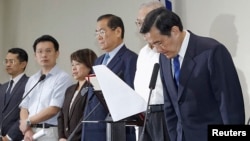Taiwan's Nationalist Party said Tuesday that President Ma Ying-jeou, who has chaired the party since late 2009, will quit the post Wednesday to atone for losses in nine mayoral and county magistrate races Saturday.
The party's defeat, more severe than forecast by opinion polls, may snarl its 2016 presidential election bid and stall dialogue with China. Taiwan's chief opposition party, which picked up seven seats on Saturday, advocates more distance from China.
Ma will remain in his post as president.
A party statement released Tuesday quoted Ma as saying he is willing to take the "utmost responsibility" for the "unprecedented huge defeat."
Owned up to role in defeat
Wu Chung-li, a political science research fellow with Taipei-based Institute Academia Sinica, said Ma's move will convince Taiwanese voters that the Nationalists, or KMT, have owned up to their role in the election defeat.
Premier Jiang Yi-huah and party Secretary General Tseng Yung-chuan had stepped down Saturday.
“It's quite obvious that he's responsible for those KMT's big losses. That is almost for sure," Wu said.
"But I would say, since the party chair decided to resign and the secretary general of the ruling party has already stepped down, I personally believe that the public can feel that the KMT is already responsible," Wu said.
The Nationalists lost strongholds such as the capital Taipei and the island's third largest city, Taichung. Its opposition, the Democratic Progressive Party, picked up seven seats and three positions went to people without party affiliation.
Analysts said voters blamed the ruling party for inaction on wages and housing prices. Many worry also about its China policy, which came into focus in March, when tens of thousands protested over signing trade deals with Beijing.
Taiwan and China split in 1949 after a civil war. China sees self-ruled Taiwan as part of its territory and hopes 21 trade, transit and investment agreements signed during Ma's term so far lead to unification after decades of hostility.
Opened dialogue
Taiwan's president broke ranks with his predecessors by laying aside political differences with China to open dialogue.
Protesters countered that even economic agreements are dangerous as long as China regards them as tools to end the island's self-rule.
Taiwan's opposition Democratic Progressive Party said it also is open to talks with Beijing but not on the premise that both sides belong to one country, a position that China opposes.
Experts said they think the opposition has a strong chance of taking the presidency in 2016.
The KMT has not announced a new chairman but has vowed to make reforms and to retain people's trust, despite Saturday's elections.
Some analysts said they believe the Nationalist government will also slow down or stop making deals with China before the presidential vote.











